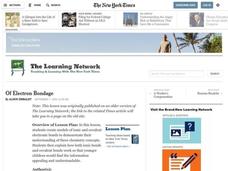Curated OER
Periodic Table Basics Review Sheet
In this periodic table worksheet, students complete a chart with the appropriate element symbol, the atomic mass and the atomic number. They classify elements by their groups and as metals, nonmetals or semi-metals. They also answer two...
Curated OER
Periodic Table Basics Test
The periodic table of elements is a vital tool for all chemistry apprentices and professionals alike. Here is a chance for your beginning chemists to assess their understanding of the periodic table. They list element names, symbols,...
Curated OER
WS 8.1 Solutions
In this solutions worksheet, students identify solutes and solvents from a list of solutions and they draw water molecules bonding to each other. They fill in the blanks with terms related to bonding in solutions, density of solutions...
Curated OER
Review Set
The topics covered in these multiple choice questions are about atomic structure and bonding, state configurations, pressure and solution concentration, and energy graphs. This is a midterm review which could be used with the whole...
Curated OER
The Chemistry of Life
After studying the different aspects of atoms and their reactivity, pupils will find this summary PowerPoint useful for review. Some of the slides are informative with labeled diagrams; others give important vocabulary. Teachers may want...
Curated OER
2004 U.S. National Chemistry Olympiad - Local Section Exam
In this National Olympiad exam worksheet, chemistry apprentices answer sixty multiple choice questions including general chemistry topics such as atomic structure, gases, problem solving, writing and balancing equations and solutions....
Curated OER
Bonding Basics - Covalent Bonds
In this chemistry worksheet, students complete the chart for each of the given elements by naming the number of protons, electrons, Valence electrons, and the electrons used to fill the outer shell. Then they complete each covalent bond...
Curated OER
Bonding
In this word search learning exercise, students locate 12 words related to molecular bonding. Words include molecule, ions, forces, polarity, partial, and particles.
Curated OER
Elements of Chemistry: Compounds And Reactions
Learners identify substances and discover common substances and their chemical composition. In this chemistry lesson students write a description of the substances and how they are used.
Curated OER
Periodic Table Basics Make-Up Test
In this periodic table worksheet, students complete a table of elements with their atomic number, atomic mass and symbol. They classify elements by their group name and distinguish between metals, nonmetals, and semi-metals. They also...
Curated OER
Periodic Table
In this periodic table and elements learning exercise, students review valence electrons, octet rule, oxidation number, and the difference between metals and non-metals on the periodic table. This learning exercise has 5 matching, 20...
Curated OER
What Information is on the Periodic Table?
In this elements worksheet, students review the information that is found on a periodic table including atomic mass, chemical symbol, atomic, number, and electron configuration. This worksheet has 7 fill in the blank questions.
Curated OER
How Do Atoms Stick Together?
In this chemical bonding activity, learners answer 10 questions about ionic bonding, covalent bonding, metallic bonding, Lewis structures, and intermolecular forces.
Curated OER
Of Electron Bondage
Students create models of ionic and covalent electronic bonds to demonstrate their understanding of these chemistry concepts. They explain how both ionic bonds and covalent bonds work so that younger students can understand.
Curated OER
Electonegativity-How Do Atoms Stick Together?
In this electronegativity worksheet, students use given electronegativity values for each element to determine the bond type in 9 molecules.
Curated OER
Different Minerals
In this minerals worksheet, students read about the relationship between elements, rocks and minerals. They experiment using 6 different colored gumdrops to represent 6 common elements. Students construct gumdrop and toothpick models of...
Curated OER
Periods and Groups; Valence Electrons; Masses
In this elements worksheet, students read how the elements are organized in periods and groups in the periodic table. Students use the periodic table to find the valence electrons and calculate molecular mass. This worksheet has 20 fill...
Curated OER
Writing Formulas by Crossing Over
In this formulas worksheet, students use the cross-over rule to determine the formula for compounds of the elements and polyatomic ions given. Students complete 15 problems.
Curated OER
Naming II-More Practice
In this naming chemical compounds worksheet, students are given 10 pairs of elements that bond and students write the formulas and the names of each compound. Students practice writing the formulas for compounds given the names and they...
Curated OER
Unit 4 - Periodic Table
There are 17 multiple choice questions on this periodic table test. The focus is on properties of the elements by group and period. The exam is not formatted well, making it a little difficult to read. There is also a typographical...
Pearson
The Chemical Context of Life
An educational presentation includes atoms, molecules, the four major elements, as well as neutrons and protons. Additionally, slides focus on atomic number, mass number, atomic weight, polar and nonpolar covalent bonding, ionic bonds,...
Normal Community High School
Classification of Matter
Steel is an example of homogeneous mixture, also called an alloy, which is made of iron and carbon. The presentation introduces learners to elements, compounds, and mixtures. They explore their similarities and differences, and then take...
Biology Junction
Chemistry
You matter—unless you multiply yourself by the speed of light squared, then you energy! Scholars learn about matter, energy, the elements and so much more using an informative presentation. Completing the included worksheet creates a...
National Institute of Open Schooling
Periodic Table and Atomic Properties
An in-depth lesson, the fourth activity in a series of 36, begins with teaching how the periodic table's arrangement came to its current design. Using this knowledge, pupils then move on to analyze the arrangement of elements to their...

























